|
|
|
Sort Order |
|
|
|
Items / Page
|
|
|
|
|
|
|
| Srl | Item |
| 1 |
ID:
076283
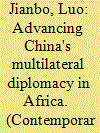

|
|
|
| 2 |
ID:
103019
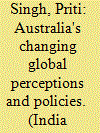

|
|
|
| 3 |
ID:
148564
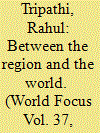

|
|
|
|
|
| Summary/Abstract |
India faces a very complex foreign policy dilemma concerning its regional and multilateral diplomacy today. On one hand it is logical that it should see strengthened regionalism as part of its global push for greater recognition and outreach. Therefore the importance of India’s regional engagements through vehicles such as SAARC, BIMSTEC and related sub regional projects can hardly be ignored. On the other hand its simultaneous thrust towards greater voice in International bodies such as the IMF and World Bank, WTO and even United Nations related agencies is part of a progression that has consistently been part of its foreign policy agenda for long. In between, it continues to pursue transregional initiatives such as BRICS, IORA and partnerships with EU as well as ASEAN.
|
|
|
|
|
|
|
|
|
|
|
|
|
|
|
|
| 4 |
ID:
172122
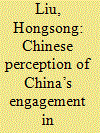

|
|
|
|
|
| Summary/Abstract |
Abstract
With China’s reintegration into the international system its involvement in multilateral initiatives, interactions with international institutions, and participation in global governance have become integral parts of Chinese foreign policy. Chinese scholars have conducted a great deal of research on these topics. The first stage of Chinese scholars’ research centered on China’s multilateral diplomacy and the interaction between China and international institutions, while the second stage focused on China’s participation in global governance. Although some scholars have made substantial achievements, in general, most of the research only interprets the ideas and policies related to global governance proposed by the Chinese government, and has not explained China’s strategies and actions in global governance. Furthermore, Chinese scholars provide little analysis on the dynamics of China’s participation in different issue areas. Many scholars have articulated a series of policy recommendations, but no specific measures have been suggested.
|
|
|
|
|
|
|
|
|
|
|
|
|
|
|
|
| 5 |
ID:
186603
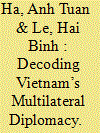

|
|
|
|
|
| Summary/Abstract |
This article explains Vietnam’s recent proactive approach to multilateral diplomacy, defined as diplomatic performance in multilateral institutions. It argues that Hanoi’s embrace of multilateral diplomacy is best explained through the lens of national interests. Vietnam has consistently placed its foreign policy in the broader dynamics of international politics. Since Ho Chi Minh, the founding father of the nation, started his struggle for the national liberation of Vietnam, multilateral institutions have been perceived as one important direction to raise Vietnam’s voice and gather supports from the international community to serve the country’s utmost interest of gaining national independence. After the independent state of Vietnam was established, Hanoi continued to pursue multilateral diplomacy to advance Vietnam’s national interests of defending the country’s security, advancing socio-economic development, and improving its role and stance in the international community. This approach is particularly hailed in recent years as a way to avoid becoming a proxy to big power competition, to mitigate significant security challenges, and to sustain economic development.
|
|
|
|
|
|
|
|
|
|
|
|
|
|
|
|
| 6 |
ID:
145676
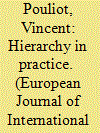

|
|
|
|
|
| Summary/Abstract |
In today’s world, a significant portion of international security politics is conducted through multilateral channels, often from the halls of international organisations such as the United Nations or NATO. This article theorises and empirically documents the production, reproduction, and contestation of local diplomatic hierarchies that practitioners often call ‘international pecking orders’. According to conventional wisdom in IR, the sources of international hierarchies are primarily structural, stemming from the interstate distribution of (material) capabilities. Yet the growing prevalence of multilateral diplomacy in the governance of international security generates distinctive forms of social stratification organised around a struggle for diplomatic competence. As they pursue their instructions and manage security politics, state representatives posted to international organisations make use of the opportunities and constraints of a given situation and compete for rank through the display of practical know-how. The article illustrates this process by looking at how a key set of multilateral practices lend themselves to pecking order dynamics, from esprit de corps to reporting through brokering. By taking the multilateralisation of security politics seriously, the article shows that international hierarchy, far from an unobservable reality, is actually part of parcel of each and every practice that makes the world go round.
|
|
|
|
|
|
|
|
|
|
|
|
|
|
|
|
| 7 |
ID:
116569
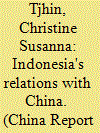

|
|
|
|
|
| Publication |
2012.
|
| Summary/Abstract |
This article looks into the recent development of Indonesia's relations with China. Notable progress can be seen in political and security relations, despite the fact that this dimension was at the core of their contentions during the 1970s and caused a freeze in diplomatic relations until the early 1990s. Economic relations, on the other hand, have long been the backbone of relations even before normalisation, but after Reformasi, economic relations have gradually been depicted as a new kind of threat even as they flourish. A unique factor contributing to this relationship is the distinctive role of Chinese Indonesians. This article also considers participation in multilateral diplomacy as an important aspect and strategy that affect bilateral relations. Under democracy, Indonesia is able to formulate a more productive and pragmatic China policy. However, since productive and pragmatic relations are not sufficiently strategic, Indonesia needs to formulate a long-term strategy to engage China and substantiate the so-called strategic partnership.
|
|
|
|
|
|
|
|
|
|
|
|
|
|
|
|
| 8 |
ID:
094090
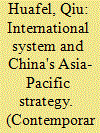

|
|
|
| 9 |
ID:
088148
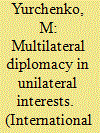

|
|
|
|
|
| Publication |
2009.
|
| Summary/Abstract |
ACCORDING TO STATEMENTS of American officials, the United States is committed to multilateral action in foreign policy. Now that a new administration moved into the White House, it is worth recalling the approaches of the previous administration. President George W. Bush said that American interests are best served by addressing problems with strong partners.1 The USA thinks multilateral diplomacy is essential for such efforts. These strong partners include the United Nations, the Organization of American States, the Asia-Pacific Economic Cooperation forum or many other international organizations where the United States plays a part and its diplomats work hard for. 2
The U.S. National Security Strategy issued in 2002 said: "We are also guided by the conviction that no nation can build a safer, better world alone. Alliances and multilateral institutions can multiply the strength of freedom-loving nations. The United States is committed to lasting institutions like the United Nations, the World Trade Organization, the Organization of American States and NATO as well as other long-standing alliances." 3
|
|
|
|
|
|
|
|
|
|
|
|
|
|
|
|
| 10 |
ID:
184660
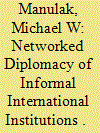

|
|
|
|
|
| Summary/Abstract |
The rise of informal international institutions has been one of the most significant developments in institutional design and choice since the 1990s. While states have increasingly opted for informal governance, little is known about the character of intergovernmental relations in these settings. Scholars, for instance, debate whether great powers dominate such institutions, or whether influence can be exercised by a wider array of players. Drawing from the author’s experience as a government representative within the Proliferation Security Initiative, a leading informal institution, this article provides a theory-driven analysis of intergovernmental interactions within such bodies. It demonstrates that diplomacy within informal institutions tends to assume a decentralized, networked quality that favors actors positioned at the center of intergovernmental networks. In doing so, the article highlights clear means through which central network positions confer influence. The article also sheds new light on the Proliferation Security Initiative and on counterproliferation cooperation more generally.
|
|
|
|
|
|
|
|
|
|
|
|
|
|
|
|
| 11 |
ID:
182969
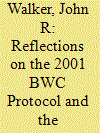

|
|
|
|
|
| Summary/Abstract |
The history of the 1972 Biological and Toxin Weapons Convention (BWC) shows that efforts to make its compliance provisions more effective have invariably fallen short. The high point of these efforts came during the 1995–2001 verification-protocol negotiations in the Ad Hoc Group (AHG). Despite solid preparation by the 1992–93 verification experts’ meetings, the AHG failed to reach agreement on a Protocol. The challenges of devising effective verification measures were then, and remain now, considerable: a combination of complex scientific, technological, diplomatic, and legal obstacles proved insurmountable. Despite the passage of time, some states parties continue to call for the AHG’s resumption, but many of those doing so have forgotten the challenges and that their own positions in the 1990s were instrumental in the AHG’s failure. This does not augur well for future efforts to strengthen the BWC at its Ninth Review Conference.
|
|
|
|
|
|
|
|
|
|
|
|
|
|
|
|
| 12 |
ID:
115375
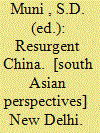

|
|
|
|
|
| Publication |
New Delhi, Routledge, 2012.
|
| Description |
x,337p.
|
| Standard Number |
9780415501910
|
|
|
|
|
|
|
|
|
|
|
|
Copies: C:1/I:0,R:0,Q:0
Circulation
| Accession# | Call# | Current Location | Status | Policy | Location |
| 056825 | 337.5105/MUN 056825 | Main | On Shelf | General | |
|
|
|
|
| 13 |
ID:
102992
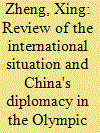

|
|
|
| 14 |
ID:
184960
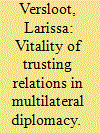

|
|
|
|
|
| Summary/Abstract |
Trust is commonly considered a foundation of multilateral diplomacy. Amidst concerns about eroding trust in this realm, due to a ‘crisis’ of multilateralism and ‘hollowing out’ of diplomacy in a socially distanced world, it is surprising that our knowledge of the role trust plays in everyday multilateral diplomacy remains limited at best. In this article, I explore how trusting relations affect multilateral diplomatic practice. I construct a novel theoretical framework that centres on the notion of ‘vitality’—a useful metaphor to capture the lively character of trusting relations and how they differ in what I call intensity, shape and age. I use this framework to analyse the workings of trust in diplomatic practice, based on empirical material gathered over three years (2018–2021) at the Council of the European Union. Contrary to what is often assumed, I find that trusting relations as such do not unequivocally enable smooth decision-making and can also hinder cooperation. We can understand this, I argue, by grasping the social opportunities and constraints that arise from trust ‘climates’ as constituted by configuring trusting relations. Overall, the analysis unpacks complexities in the connection between trust and cooperation in multilateralism. The analytical vocabulary offered in this article allows both scholars and practitioners to comprehend the manifold ways in which trust matters in multilateral diplomacy.
|
|
|
|
|
|
|
|
|
|
|
|
|
|
|
|
|
|
|
|
|